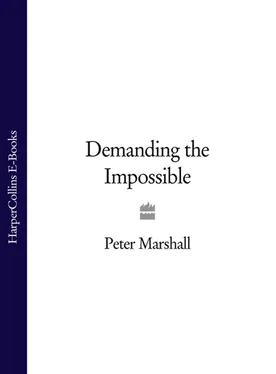Anarchists are not therefore immoralists asserting absolute freedom for themselves alone. They do not, like Dostoevsky’s Underground Man, believe that it is right to assert one’s independence whatever it may cost and wherever it may lead, or maintain that the greatest good is ‘one’s own free and unfettered volition, one’s own caprice, however wild, one’s own fancy, inflamed sometimes to the point of madness …’ 12 To see freedom entirely in personal terms in this way would seem to justify the kind of self-assertion which leads to the oppression or exploitation of others.
Malatesta argued for instance that the simple desire to be free to do as one pleases is not enough to make an anarchist: ‘That aspiration towards unlimited freedom, if not tempered by a love for mankind and by the desire that all should enjoy equal freedom, may well create rebels who, if they are strong enough, soon become exploiters and tyrants, but never anarchists.” 13 Malatesta believed that men are not naturally harmonious, and that living together in society involves a limitation on freedom since we must sacrifice desires which are irreconcilable with those of others. He called for freedom as the power to do as one wishes with the important proviso that it must be ‘freedom for everybody and in everything, with the only limit of the equal freedom for others’. 14
Even the most extreme individualist anarchist Max Stirner does not entirely reject morality and believes voluntary co-operation with other rational egoists desirable. While refusing to accept binding moral rules imposed from without, anarchists look to some form of morality to replace political authority. Kropotkin looked to our innate moral sense as a compass in a free society, and argued that moral principles should replace man-made laws as a guide to human conduct. Even the arch-individualist Benjamin Tucker insisted on a moral code, even if he did reduce the only moral law to ‘Mind your own business’. 15
To adopt moral rules for oneself is not therefore inconsistent with anarchism. Government, with its laws, restricts our freedom by the threat of force, but if a person imposes rules on himself he is not being compelled but acting voluntarily. Freedom in the sense of government by reason is quite acceptable. As Tucker wrote: ‘If the individual has a right to govern himself, all external government is tyranny’. 16 The idea of ruling oneself rather than being ruled by others is implicit in the anarchists’ advocacy of self-government and self-management. The whole thrust of the anarchist argument for social freedom is that the absence of laws would not lead to a state of moral chaos or disorder since people are capable of governing themselves.
Nevertheless, they do not accept that rational freedom in the sense of governing oneself through constraints imposed from within is enforceable in any way. It is not for the community to compel one to obey the general will; anarchists will have no truck with Rousseau’s pernicious paradox that it is possible to ‘be forced to be free’. 17 On the other hand, they would accept Kant’s view of autonomy as self-imposed rules which have been freely chosen for oneself.
The anarchist stress on personal morality does not of course mean a commitment to past values. Kropotkin sees the value of age-old patterns of co-operation and mutual aid, but would like to combine them with a modern sense of individuality. Most anarchists call, like Nietzsche and Emma Goldman, for a transvaluation of values, a going beyond existing definitions of good and evil, to forge a new morality for a free society. 18
While rejecting man-made laws, all the classic anarchist thinkers except Stirner recognize the force of natural law as a way of achieving social cohesion in the absence of government and man-made laws. Godwin believed that the universe was governed by universal laws and believed that truth is always victorious over error. He was convinced that morality is independent of positive institutions; that it is ‘immutably true’ that whatever tends to procure a balance of happiness and pleasure is to be desired. 19 Proudhon too based his whole case for anarchy on the existence in nature and human nature of immanent justice which was revealed through his moral sense.
Bakunin presented himself as a ‘scientific’ anarchist and argued that natural law is the foundation of our liberty. He celebrated the liberty which consists in the full development of our potential. ‘the liberty which recognizes no other restrictions than those which are traced for us by the laws of our own nature’. But according to Bakunin these are no real restrictions since ‘these laws are not imposed on us by some outside legislator, beside us or above us; they are immanent in us, inherent, constituting the very basis of our being, material as well as intellectual and moral; instead, therefore, of finding them a limit, we must consider them as the real conditions and effective reason for our liberty.’ 20
Kropotkin, too, argued that anarchism should be based on the method of modern science. He believed the same laws governed nature and society, especially the law of sociability, which gave rise to a social instinct in animals and humanity and enabled them to survive in the struggle for existence and develop a moral sense. Although Malatesta criticizes the attempt to make anarchism ‘scientific’, since this would deny free will, he still recognized ‘the great law of solidarity, which predominates in society as in nature’. 21
It should now be clear that anarchists do not take absolute freedom as their ideal. Given the physical and social limits we all experience, the very idea of absolute freedom is strictly speaking absurd. Without recognizable limits, a definition of freedom is empty and meaningless. Such ‘freedom’ if it could exist would be like the senseless and hopeless ‘inviolability’ which K experiences in Kafka’s The Castle when people have broken off relationships with him and left him alone. 22
It has even been questioned whether freedom is the supreme ideal of anarchists. As Malatesta wrote, since living in society necessarily involves curbing some of our desires ‘ freedom , in its absolute sense, could not solve the question of a happy and voluntary co-existence’. 23 In addition, for those who principally define freedom negatively as freedom from restraint it is difficult to see how it can be a supreme value. Even as a necessary condition of self-development it is valued as a means, not an end. Godwin, for instance, argued that civil liberty is chiefly desirable as a means to encourage a certain type of personality: ‘To be free is a circumstance of little value, if we could suppose men in a state of external freedom, without the magnanimity, energy and firmness that constitute almost all that is valuable in a state of freedom.’ 24
Again, the anarchists’ readiness to use public opinion, censure and social pressure to reform conduct in place of law and punishment might suggest that they do not value freedom above everything else. Censure, even in the form of reasoned argument, curtails the freedom of some in an anarchist society to enable the maximum amount of freedom for all. By wishing to combine the greatest individual development with the greatest communal unity, Alan Ritter has argued that their overriding goal is ‘communal individuality’ and that they therefore cannot strictly speaking be called ‘libertarians’; their libertarianism is ‘not of direct intention, but of oblique effect’. 25 Freedom is thus valued more as a means than an end.
This view, while pointing to an important element in the anarchist conception of freedom, is not comprehensive enough. Stirner, Tucker and other individualist anarchists, for instance, do not see community as supporting individuality. But it does remind us that anarchists accept that liberty has physical and social limits and recognize that personal freedom is inevitably curtailed in some way by the freedom of others. For the strict individualist other people must inevitably stand as a constant threat to his or her freedom.
Читать дальше












